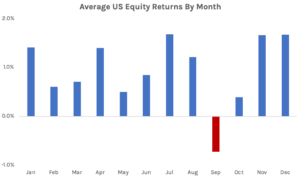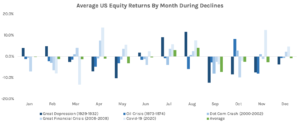Details Are Part of Our Difference
David Booth on How to Choose an Advisor
20 Years. 20 Lessons. Still Taking the Long View.
Making the Short List: Citywire Highlights Our Research-Driven Approach
The Tax Law Changed. Our Approach Hasn’t.
Tag: investing
Living Our Values: Reflections from Hill’s 2025 Summer Interns

At Hill, we strive to make our backstage values visible on the front stage. In other words, how we work is just as important as what we achieve. We aim to live our values daily so clearly that even our newest team members can recognize them in action, and our clients can see them, too.
As our 2025 summer interns wrap up their time with us, we asked each of them to reflect on their experience and share how they observed Hill’s culture at work.
Last month’s summer party was a great example of how Hill blends business with fun. Remote team members flew in, and I finally got to meet people I’d only seen on Zoom. Connecting in a relaxed, in-person setting made the team feel even more welcoming and real.
The event also marked Hill’s 20-year anniversary—an experience I feel lucky to have shared. Hearing stories from long-time team members gave me perspective on the firm’s journey and the values that built it. What stood out most was how intentionally Hill celebrates people and milestones. It’s clear that fun and community are a meaningful part of how the team stays connected and motivated.
My time at Hill deepened my understanding of evidence-based investing in ways I didn’t expect. From the beginning, I was given meaningful work and encouraged to understand the “why” behind it. I was introduced early on to the Fama-French Five-Factor Model, which helped me connect ideas like profitability and market cap to Hill’s investment philosophy.
That first project sparked curiosity, and I kept exploring. Team members offered resources, asked great questions, and created space for learning. Their support made it clear that growth is a shared value here.
A standout moment for me was building a model for trades. It was more complex than I anticipated, and I went through several rounds of refinement. It would have been easy to rush, but I reminded myself that precision matters more than speed.
With help from the team, I asked questions, improved steadily, and ultimately built something I was proud of—not just for the outcome, but for how I got there. I saw firsthand how patience and discipline are part of Hill’s daily rhythm.
Legend in Investing – Charles Ellis
Do you want to see and hear an investment legend interviewed by two of the nicest and smartest advisors I know? Tune into this episode of the Rational Reminder podcast with guest Charles Ellis, famous author, investing authority, and a top-notch communicator.
Cameron Passmore cohosts the Rational Reminder and is someone I consider a friend. He and his talented partner, Ben Felix, run one of the best podcasts related to investing. If you like this episode I suggest subscribing to their channel.
Here’s the rundown of what’s covered:
0:00 Intro
4:18 Charley defines a “Loser’s Game”
8:21 Why money management is a loser’s game
11:38 How the market has changed since writing about the loser’s game
19:09 Whether or not the sentiment toward active management is negative
22:03 Types of investor who should not invest in low-cost index funds
30:27 What investors and their advisors should be focused on
37:25 The importance of a well-defined investment policy statement
39:01 What investors can do to protect themselves from themselves
40:43 The most under-appreciated action investors can take to be more successful
50:16 Charley’s opinion on Vanguard’s entry into private equity
55:27 Where Charley sees the biggest future opportunities in the field of investment
1:00:15 What has made Vanguard successful as a company
1:08:14 What Charley has learned about personal motivation and productivity
1:12:04 Charley defines success in his life
1:14:12 Outtake
If you’d rather listen to the episode instead of watching on YouTube here is a link via Apple Podcasts.
Broken Clocks are Right Twice a Day

Does anyone know when to get in and out of the market? Many professionals try, and we’ve heard a few theories from amateur investors lately. It’s tricky to tell fact from fiction. There are a million ways to analyze historical data to find timing patterns that appear to produce attractive returns. The real question you need to ask yourself: “Is there any reason why I should expect that pattern to continue in the future, or is it purely due to chance?”
An example. Over the last thirty years, if you sorted stocks based on the letter of the alphabet they started with, you would see that stocks that began with the letter “M” outperformed those that started with the letter “E.” Is there any reason to suspect this to continue over the next 30 years?
No, clearly, the letter of the alphabet should have no impact on a company’s returns. The reason for this difference is that Microsoft was a large, successful company over this period, while Enron was a large, unsuccessful company over this period.
When working with “noisy” data, the odds that the results are evenly distributed is very small. If you roll a die six times, the odds of getting each number exactly once is tiny (1.5%). That means there is a 98.5% chance you will roll some number two or more times and some number zero times.
A typical market timing strategy we hear about around this time of year is to “avoid investing in the month of September.” At first thought, it seems odd that September would produce below-average returns, but when you look at the historical data, it is true!

Is there any economic rationale as to why this should continue in the future? I can’t think of any. Some claim that it is due to market participants selling positions to clean up their books after taking time off in the summer. If that were true, why wouldn’t investors try and get ahead of it and sell in August? Or why wouldn’t hedge funds gobble up all the low-priced stocks and keep prices stable?
Let’s dive deeper into the data and look at the five largest market declines over the last 100 years. Each drop produced several months of negative returns, but all five of them spanned September at some point.

The recession peaked in different months every time, and every month was hit negatively at some point. However, there was bound to be one month affected more than others. It just happened to be September. From 1926 to 2021, 52% of the September months had positive returns. The large negative returns from a few market downturns have skewed the average to be negative. The question is, do we expect this to continue in the future?
Whenever you hear of these market timing strategies, you need to ask yourself if there is a logical economic rationale as to why the trend existed in the past and why it should continue in the future. Is there some risk associated with September we don’t know about? Is there some behavioral rationale that investors can’t arbitrage away? If you can’t come up with a concrete reason, whatever anomaly you are looking at is most likely due to chance and not a reliable trading strategy to implement in the future. Before accepting any investment truism, it is important to be sufficiently skeptical before implementing it yourself.
Returns from Fama/French CRSP Data Library.

